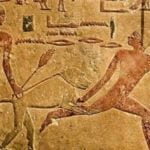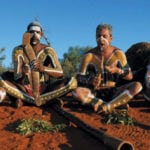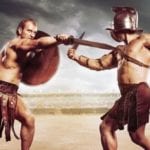 Our World
Our World  Our World
Our World  Crime
Crime 10 Dark Details of the “Bodies in the Barrels” Murders
 Animals
Animals The Animal Kingdom’s 10 Greatest Dance Moves
 Movies and TV
Movies and TV 10 Box Office Bombs That We Should Have Predicted in 2025
 History
History 10 Extreme Laws That Tried to Engineer Society
 History
History 10 “Modern” Problems with Surprising Historical Analogs
 Health
Health 10 Everyday Activities That Secretly Alter Consciousness
 History
History Top 10 Historical Disasters Caused by Someone Calling in Sick
 Animals
Animals 10 New Shark Secrets That Recently Dropped
 Movies and TV
Movies and TV 10 Forgotten Realities of Early Live Television Broadcasts
 Our World
Our World 10 Places with Geological Features That Shouldn’t Exist
 Crime
Crime 10 Dark Details of the “Bodies in the Barrels” Murders
 Animals
Animals The Animal Kingdom’s 10 Greatest Dance Moves
Who's Behind Listverse?

Jamie Frater
Head Editor
Jamie founded Listverse due to an insatiable desire to share fascinating, obscure, and bizarre facts. He has been a guest speaker on numerous national radio and television stations and is a five time published author.
More About Us Movies and TV
Movies and TV 10 Box Office Bombs That We Should Have Predicted in 2025
 History
History 10 Extreme Laws That Tried to Engineer Society
 History
History 10 “Modern” Problems with Surprising Historical Analogs
 Health
Health 10 Everyday Activities That Secretly Alter Consciousness
 History
History Top 10 Historical Disasters Caused by Someone Calling in Sick
 Animals
Animals 10 New Shark Secrets That Recently Dropped
 Movies and TV
Movies and TV 10 Forgotten Realities of Early Live Television Broadcasts
10 Facts About Tarzan That Will Surprise You
Tarzan of the Apes is one of the best known characters in all of fiction. The lord of the jungle was the subject of 24 novels by Edgar Rice Burroughs, as well as authorized sequels by Fritz Leiber, Joe Lansdale, Philip Jose Farmer, Robin Maxwell, and Will Murray. He’s also been the main character of a radio program, newspaper comic strips, numerous comic books, multiple TV shows, and countless movies.
Despite all this, there are many things people don’t know about this near-mythic character. The original novels are full of interesting and bizarre details that have seldom made it to other media. So with the new The Legend of Tarzan releasing in July 2016, we thought it would be a good time to look back at Tarzan as he appeared in the original novels.
10 The Origin Of Tarzan’s Name

In the world of Edgar Rice Burroughs (pictured above), the great apes have their own unique language. And according to this primate dialect, “tar” means “white,” and “zan” means “skin.” Put these two together, and voila, you get “Tarzan.” In the novels, Tarzan’s adoptive ape-mother, Kala, gives him this name when she sees his pale, hairless skin.
But Burroughs didn’t come up with that name out of nowhere. In 1910, while he was living in Chicago, Burroughs fell in love with the southern California community of Tarzana. He even purchased some land there. Several years later, when he needed a name for the human boy raised by apes, he thought of Tarzana. He dropped that final vowel from the end, and a legend was born.
Interestingly, the community wasn’t officially named Tarzana—or anything else, for that matter—until it incorporated and got a post office in 1930. This has led to the urban myth that the town was named for the ape-man, but the truth is actually the other way around.
9 Tarzan Was Not Raised By Gorillas

Everybody knows Tarzan was raised by gorillas. It’s part of the established Tarzan lore . . . right? Well, this is a common misconception. In fact, it’s so common that a number of movies have gotten it wrong.
Tarzan was actually raised by a species of ape unknown to science. These creatures resemble gorillas in size and strength, but they differ in other ways. These great apes often walk upright, hunt animals, eat meat, and have a spoken language. They call themselves the “mangani,” and Burroughs describes them as “huge,” “fierce,” and “terrible.” He adds that they’re “a species closely allied to the gorilla, yet more intelligent.” Thanks to their smarts and strength, the mangani are “the most fearsome of these awe-inspiring progenitors of man.”
As for gorillas, the mangani refer to them as the “bolgani.” And believe it or not, Tarzan actually does battle with these massive primates. In Tarzan of the Apes, Burroughs describes a young Tarzan’s first encounter with a massive gorilla:
“He had taken scarce a dozen steps toward the jungle when a great form rose up before him from the shadows of the low brush. At first he thought it was one of his own people but in another instant he realized it was Bolgani, the huge gorilla.
So close was he that there was no chance for flight and little Tarzan knew that he must stand and fight for his life; for these great beasts were the deadly enemies of his tribe, and neither one nor the other ever asked or gave quarter.”
8 The Lost Civilizations
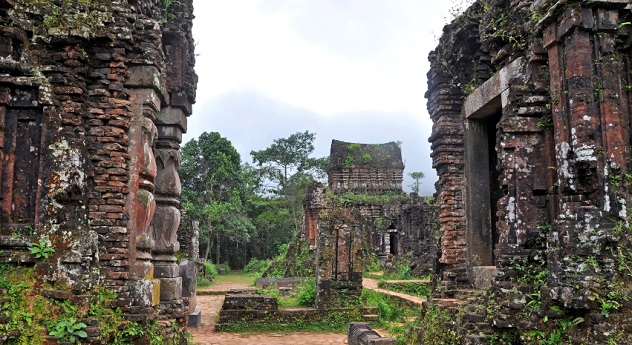
There were other writers who wrote fantasy stories about Africa before Edgar Rice Burroughs, and they undoubtedly influenced him. The most important of these writers was H. Rider Haggard, an author who specialized in vivid descriptions of lost cities in novels like She and King Solomon’s Mines.
Burroughs started writing four decades after Haggard, but there were still huge sections of Africa that hadn’t been mapped or explored. It was easy to think that there were undiscovered civilizations on the so-called “dark continent,” and Burroughs let his imagination run wild. He created over a dozen of these realms for Tarzan’s adventures.
For example, Opar is the last remains of an ancient Atlantean outpost. It’s populated by ape-like men and gorgeous women. Opar also contains a fabulous fortune in gold ingots and precious stones, all hidden within the city. Tarzan raids this treasure to replenish his personal fortune. As for the name, it’s possible that Opar was inspired by the wealthy, biblical city of Ophir.
Then there’s the City of God, one of Burroughs’s most unusual creations. The ruler of this community is a British scientist who’s dubbed himself “God,” and he uses his knowledge of genetics to place his mind into the body of a gorilla. He also has imbued a tribe of gorillas with human intelligence and the personalities of Henry VIII and the members of his royal court. It’s quite possible that this all-powerful ape was the inspiration for the DC Comics supervillain Gorilla Grodd.
Of course, we’re just scratching the surface here. In Tarzan and the Ant-Men, our hero finds two rival cities populated with 46-centimeter-tall (18 in) humans. In Tarzan, Lord of the Jungle, there’s a valley inhabited by crusaders, stranded there since the 12th century. And in Tarzan Triumphant, we find a city of epileptic religious fanatics who view their seizures as a gift from God.
Then there’s Pal-ul-don, a city inhabited by dinosaurs, and let’s not forget Xuja, a town of lost madmen who raise lions for food and worship parrots and monkeys. There’s also Kaji and Zuli, cities ruled by a wizard who uses an occult gem to control both populations. And then there’s the Portuguese-style castle run by the descendants of conquistadores and local Africans. It’s the only lost city in all of Tarzan’s Africa that is not run by white-skinned people.
7 Tarzan Is A British Lord

While he spends most of his time swinging through the jungle, Tarzan is really a British lord. If you’ve seen the 1984 film Greystoke: The Legend of Tarzan, Lord of the Apes, then you might already know about his aristocratic background. But Tarzan’s birthright is actually established in the first novel.
In the book, Tarzan’s parents, John and Alice Clayton, are also Lord and Lady Greystoke. They die in the first novel, and it’s not until the end of The Return of Tarzan that the ape-man claims his proper inheritance.
“Lord” isn’t exactly a title, though. In England, it’s the form of address used when speaking to a duke, marquess, earl, viscount, or baron. So what was Tarzan’s proper title? Burroughs reveals this when one of the Knights of Nimmr meets the ape-man in chapter 19 of Tarzan, Lord of the Jungle:
“‘I am called Tarzan,’ said the ape-man.
‘And thy rank?’ inquired Sir Bertram.
Tarzan was mystified by the strange manners and garb of his seemingly friendly inquisitor, but he sensed that whatever the man might be he took himself quite seriously and would be more impressed if he knew Tarzan was a man of position, and so he answered him truthfully, in his quiet way.
‘A viscount,’ he said.”
This would mean that Tarzan, who was named after his father, is actually John Clayton, Viscount Greystoke. Then again, in Tarzan Alive, the unauthorized “biography” of the lord of the jungle, Philip Jose Farmer points out that the title of viscount was not used in England until the 15th century. In other words, the Knights of Nimmr wouldn’t have recognized it. Farmer then suggests that Tarzan also held the older title of Earl of Greystoke. While that’s not official, the movie Greystoke actually supports this theory.
6 Tarzan Does Not Live In A Tree House
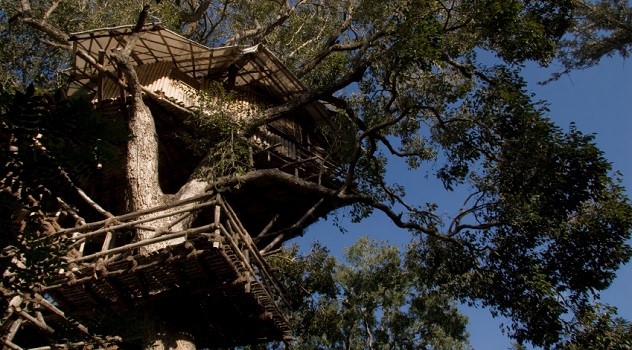
Beginning with the Johnny Weissmuller movies of the 1930s, Tarzan and Jane were often shown living in a primitive but elaborate tree house, deep in the jungle. Surprisingly, this was not the case in the novels. Tarzan’s English-style house is first described in The Eternal Lover, a Burroughs novel where Tarzan has a minor role:
“South of Uziri, the country of the Waziri, lies a chain of rugged mountains at the foot of which stretches a broad plain where antelope, zebra, giraffe, rhinos and elephant abound, and here are lion and leopard and hyena preying, each after his own fashion, upon the sleek, fat herds of antelope, zebra, and giraffe. Here, too, are buffalo—irritable, savage beasts, more formidable than the lion himself Clayton says.
It is indeed a hunter’s paradise, and scarce a day passed that did not find a party absent from the low, rambling bungalow of the Greystokes in search of game and adventure . . . ”
We get a slightly more detailed picture of the house in The Son of Tarzan when our hero offers to let a girl named Meriem stay there. According to Burroughs, Tarzan lives in a “flower-covered bungalow behind which lay the barns and outhouses of a well-ordered African farm.”
When he’s not off fighting wild animals or discovering lost cities, Tarzan is surprisingly domestic.
5 Edgar Rice Burroughs Killed Jane
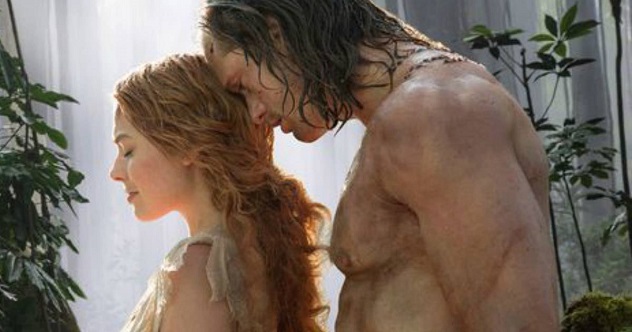
The first actress to play Jane Porter was Enid Markey in Tarzan of the Apes. Unfortunately, Ms. Markey was a brunette, which went against Burroughs’s image of Jane. In the novels, Jane is actually a blonde. (She isn’t British, either. She’s actually from Maryland.) It didn’t help that Burroughs hated Markey’s performance. In fact, he supposedly hated it so much that he killed off Jane in his next story.
In the first chapter of Tarzan the Untamed, Tarzan is away from home when World War I breaks out. When he returns, he finds that German soldiers have looted and burned his home, killing many of his servants and friends in the process. And shockingly, they’ve murdered Jane.
As Burroughs puts it:
“For a long time [Tarzan] stood there just looking down upon the dead body, charred beyond recognition, and then he stooped and lifted it in his arms. As he turned the body over and saw how horribly death had been meted he plumbed, in that instant, the uttermost depths of grief and horror and hatred.
Nor did he require the evidence of the broken German rifle in the outer room, or the torn and blood-stained service cap upon the floor, to tell him who had been the perpetrators of this horrid and useless crime.
For a moment he had hoped against hope that the blackened corpse was not that of his mate, but when his eyes discovered and recognized the rings upon her fingers the last faint ray of hope forsook him.”
It’s a tragic scene, and it launches Tarzan on a brutal quest for vengeance. The ape-man hunts down and kills every German soldier he can find, whether they were involved or not. It’s a departure for Tarzan, whose actions are usually very noble.
Of course, Jane wasn’t really dead. She wasn’t even mostly dead. Since the story was published as a serial, Burroughs changed Jane’s fate before the final chapter, although no one is sure why. At the end of the story, Tarzan discovers that Jane was abducted, not killed. The body he discovered was that of a maid, burned beyond recognition so the ape-man would think it was his wife. The reason for this elaborate hoax is never revealed, and it leaves a pretty big hole in the plot, but fans didn’t care.
Jane was back.
4 Tarzan Auditioned For A Tarzan Movie
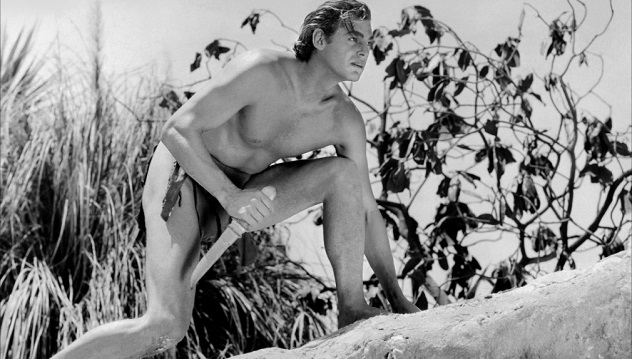
Edgar Rice Burroughs had a love/hate relationship with Hollywood. He loved the exposure and extra income, but he hated the way movies changed his character. He particularly disliked Elmo Lincoln, the first movie Tarzan, who was afraid of heights. Lincoln was also a beefy man with a 132-centimeter (52 in) chest in contrast to the lean, athletic Tarzan of the books.
Nor was Burroughs happy with Johnny Weissmuller (pictured above), the most famous movie Tarzan. He wanted Tarzan to be articulate, but Weissmuller’s version could barely speak English.
The author took out his frustration in Tarzan and the Lion Man. In this novel, our hero rescues a movie crew filming in the African jungle. Along the way, Burroughs mocks the actors, directors, and moviemaking in general. But the coup de grace comes in the last chapter. After his adventure, Tarzan visits Hollywood, and he’s taken to meet a casting director:
“The casting director sized Clayton up. ‘You look all right to me; I’ll take you up to Mr. Goldeen; he’s production manager. Had any experience?’
‘As Tarzan?’
The casting director laughed. ‘I mean in pictures.’
‘No.’
‘Well, you might be all right at that. You don’t have to be a Barrymore to play Tarzan. Come on, we’ll go up to Mr. Goldeen’s office.’
They had to wait a few minutes in the outer office, and then a secretary ushered them in.
‘Hello, Ben!’ the casting director greeted Goldeen. ‘I think I’ve got just the man for you. This is Mr. Clayton, Mr. Goldeen.’
‘For what?’
‘For Tarzan.’
‘Oh, m-m-m.’
Goldeen’s eyes surveyed Clayton critically for an instant; then the production manager made a gesture with his palm as though waving them away. He shook his head. ‘Not the type,’ he snapped. ‘Not the type, at all.’”
3 Tarzan Knows Martial Arts
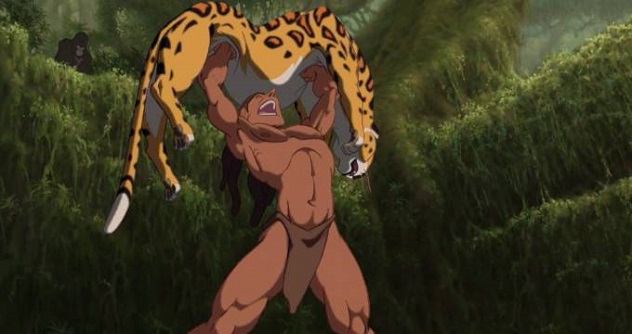
A man who is strong and agile enough to wrestle great apes probably doesn’t need more of an edge, but he has one anyway. According to Joe Lansdale’s authorized novel, Tarzan, the Lost Adventure, the ape-man once visited the Shaolin Temple to study kung fu. For this list, though, we’re going to limit ourselves to the Burroughs novels.
So did Edgar Rice give Tarzan martial arts skills? Well, in The Beasts of Tarzan, Burroughs talks about this in a general way:
“With a low snarl the beast now hurled himself at Tarzan, but the ape-man had found, among other things in the haunts of civilized man, certain methods of scientific warfare that are unknown to the jungle folk.
Whereas, a few years since, he would have met the brute rush with brute force, he now sidestepped his antagonist’s headlong charge, and as the brute hurtled past him swung a mighty right to the pit of the ape’s stomach.”
It looks like Tarzan has learned to box, and it’s safe to assume that he studied wrestling, too. It’s even possible that he’s studied savate, the French form of kickboxing, since the European who introduced him to civilization was a Frenchman named Paul d’Arnot. But the one martial art we know for certain he studied is jujitsu. In Tarzan the Untamed, Burroughs writes:
“The ape-man, as the girl watched him, seemed entirely unprepared for the charge and she looked to see him borne down and slain at the first rush. The great bull [ape] was almost upon him with huge hands outstretched to seize him before Tarzan made a move, but when he did move his quickness would have put Ara, the lightning, to shame. As darts forward the head of Histah, the snake, so darted forward the left hand of the man-beast as he seized the left wrist of his antagonist. A quick turn and the bull’s right arm was locked beneath the right arm of his foe in a jujutsu hold that Tarzan had learned among civilized men—a hold with which he might easily break the great bones, a hold that left the ape helpless.”
2 Tarzan And Jane Are Immortal
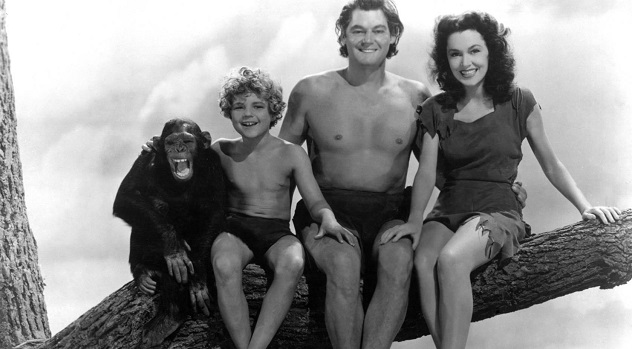
In Tarzan’s Quest, the ape-man comes into conflict with the Kavuru, a hostile tribe that’s terrorizing the jungle and stealing women. They even kidnap Jane. It also turns out that the Kavuru are immortal, having developed a pill that grants them eternal youth. In chapter 28, the Kavuru high priest explains to Jane:
“‘You can serve the only purpose for which women are fit. Man may only attain godliness alone. Woman weakens and destroys him. Look at me! Look at my priests! You think we are all young men. We are not. A hundred rains have come and gone since the latest neophyte joined our holy order. And how have we attained this deathlessness? Through women. We are all celibates. Our vows of celibacy were sealed in the blood of women; in our own blood will we be punished if we break them. It would be death for a Kavuru priest to succumb to the wiles of a woman.’
Jane shook her head. ‘I still do not understand,’ she said.
‘But you will. Long ago I learned the secret of deathless youth. It lies in an elixir brewed of many things—the pollen of certain plants, the roots of others, the spinal fluid of leopards, and, principally, the glands and blood of women—young women. Now do you understand?’”
After Tarzan rescues Jane, they return home with a box of the immortality pills and divide them among their allies. They even let Tarzan’s monkey companion, Nkima, have some of their immortal medicine. With that in mind, it’s odd that Tarzan and Jane didn’t think to get a few pills for their son, Korak, and his wife, Meriem. But they weren’t in this particular book, so the heck with them.
1 Tarzan Flew To The Center Of The Earth

In addition to the Tarzan books, Burroughs wrote several other series, including the Pellucidar novels. In these stories, adventurers David Innis and Abner Perry build an experimental drilling machine and discover the Earth is hollow. In fact, it’s even lit by an interior sun. This world is inhabited by dinosaurs, primitive humans, and a large variety of intelligent, non-human races.
In Tarzan at the Earth’s Core, the ape-man and a small group of companions go in search of Innis and Perry. Tarzan uses his wealth to finance the construction of a special dirigible called the O-220. Using this huge flying machine, they travel through a gigantic hole at the North Pole, and by passing through the tunnel, they end up in the center of the world.
The idea of a Hollow Earth is an actual pseudoscientific idea that’s been around since the 18th century. It’s not clear if Burroughs took this idea seriously, but he certainly found it useful in his fiction. In fact, this concept wasn’t just limited to the Earth. In his novels The Moon Maid and The Moon Men, the Moon is also hollow and contains several ancient civilizations.
Matthew Baugh is the author of more than 40 published short stories and three novels: The Vampire Count of Monte Cristo, A Girl and Her C.A.T. (with Win Scott Eckert), and The Avenger: The Sun King. He is a longtime comic book and pop culture nerd as well as an ordained pastor.

